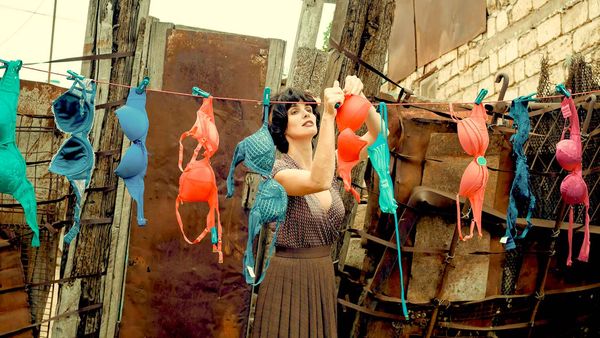Eye For Film >> Movies >> The Bra (2018) Film Review
The Bra
Reviewed by: Amber Wilkinson

There's a sweet echo of Jacques Tati about this silent film charmer from Azerbaijan, as German director Veit Helmer serves up a gently absurdist tale of a lonely soon-to-retire train driver Nurlan (Predrag 'Miki' Manojlovi) looking for love.
Nurlan leads a simple life in a village, heading down to the railway yard each day to drive his train - and train up his successor (Denis Lavant, who seems to struggle to reign in his performance as much as everyone else). It's a far from simple journey, as the locomotive must pass within a hair's breadth of houses along the route. The fizz of the signal box light change is the trigger for street kid (Ismail Quluzade) to run along the track, blowing a whistle and shooing folk out of the way, with plenty of humour offered up by the assortment of people playing games on tables straddling the sleepers or women scurrying to take down washing that is strung across the tracks.

At the end of the day, Nurlan cleans the engine and, upon finding unintended extras - a kid's ball or a tablecloth - does his best to walk along the tracks and return them to their rightful owners before heading home. Things are not so straight forward, however, when on the eve of his retirement, he finds a woman's bra caught in the locomotive's grill and embarks on a Prince Charming style quest for whom the cupsize fits.
In less scrupulous hands, this could have turned into a Benny Hill-style farce, but Helmer takes time to set up Nurlan as a pure-hearted soul, whose desire to find the woman springs more from an urge for companionship than from a desire to cop a feel. The train driver's encounters with women along the track are shot as chastely as possible, especially at the outset, and the humour is of the slow-build sort rather than simply reliant on slapstick. Some of the women arv abrupt, others display powerful longings of their own, such as one who sees his appearance as an opportunity to give her seven veils routine a bit of a go. Far from being lascivious, Nurlan is wistful, and Manojlovi, who has the look of a sort of hangdog Walter Mathau, favours expressions of surprise, puzzlement and resignation over anything so low-brow as lust.
Helmer also takes time to build the world in which the film is set, so that we learn about Lavant's character's affinity for creating music from machinery and see, in a increasingly funny scene, how Nurlan's aspirations to marry a local shepherdess are thwarted, not by his presentation of electronic gadgets and a gorgeous goat kid, but by his inability to prove his physical strength. Like the lace that underlays the film's opening credits, everything in this film has a distinctive texture and unlike many silent films of the modern era - such as those by Dominic Abel and Fiona Gordon - it is more than just a series of vignettes loosely strung together. The story arc has weight, depth, and even a little poetry, with cinematographer Felix Leiberg making the most of whatever is to hand, from dramatic mountainous backdrops to pools of warm light at night. The train's route may be fixed but Helmer's plot takes several satisfying detours before arriving at an unexpected but welcome destination.
Reviewed on: 27 Nov 2018















